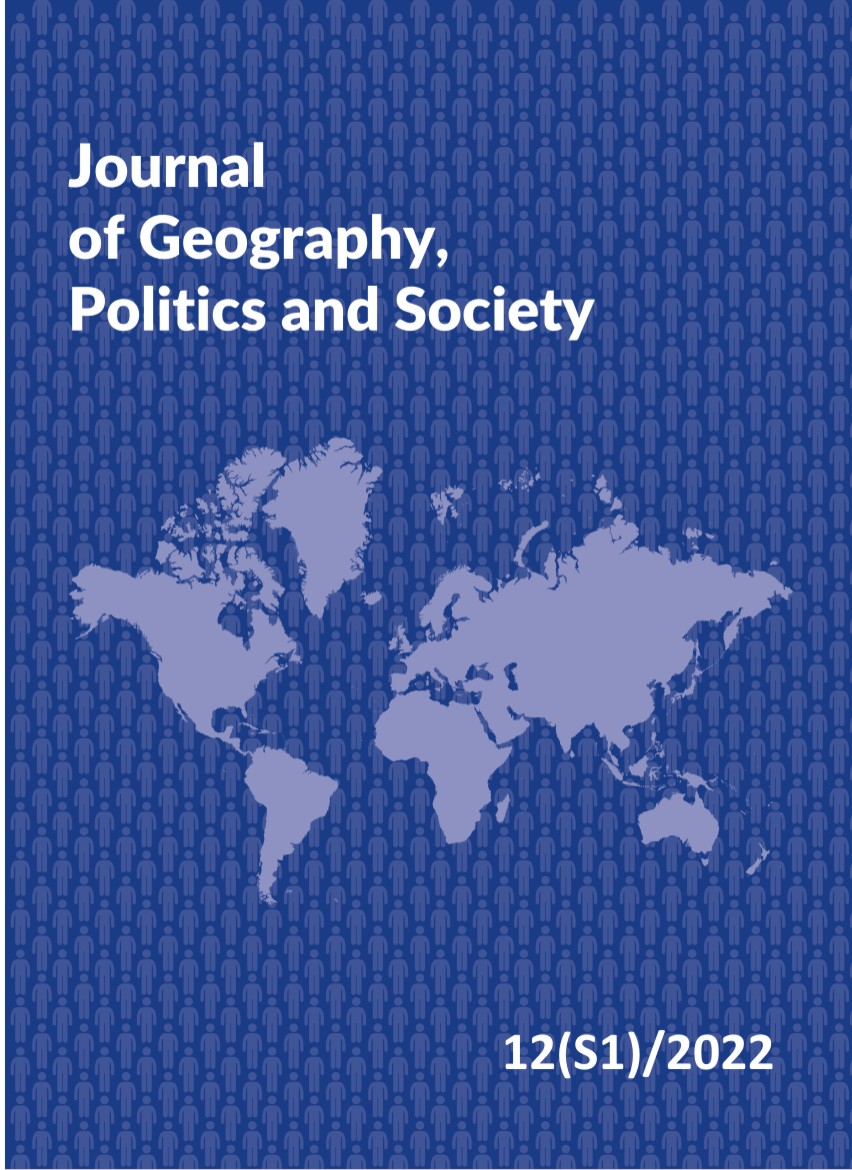Historical politics as a tool of the ideological justification of Russian neo-imperialism
DOI:
https://doi.org/10.26881/jpgs.2022.S1.04Keywords:
historical memory, historical politics, identity, manipulationAbstract
A number of modern Russian political discourse provisions which consist of tendentious interpretations of Russian and Ukrainian history and which result in frank and systematic manipulation of historical memory have been analyzed. Their goals are to justify Russia’s aggressive policy towards Ukraine to prove and legalize the right to decide the fate of the Ukrainian people and to determine the vectors of the Ukrainian foreign policy. At the same time, they are aimed at discrediting the Ukrainian government and delegitimizing Ukrainian statehood as well as ultimately distorting and leveling Ukrainian national identity. The outdated concept of Ancient Rus as the cradle of “three brotherly peoples”, i.e. Russians, Ukrainians and Belarusians, or its more archaic version about the existence of a single Russian nation, whose branches are actually Russians, Ukrainians and Belarusians, is used. A component of this concept is the idea of Russia being the direct and sole legal heir of Ancient Rus, whose historical mission was and remains the gathering of ancient Russian lands, which include the lands of Ukraine and Belarus. Accordingly, the separate existence of the Ukrainian people, and hence their right to state independence, is either denied altogether or conditionally recognized, if they maintain inseparable ties with Russia and renounce the Western vector of foreign policy. Modern Ukraine is considered by the Russian authorities and the political establishment as “anti-Russia”, which has no right to exist.
Attempts to apply the tools of the historical politics of the Russian Federation. In particular, it concerns historical education and memorial practices in the Donetsk and Luhansk regions of the Donbas, where the territory temporarily is not controlled by Ukraine. These territories are also considered a model for similar measures used on temporarily occupied territories during the 2022 war.
Downloads
References
Âkovenko N., 2005, Naris ìstorìï seredn’ovìčnoï ì rann’omodernoï Ukraïni (Eng. Essay on the history of medieval and early modern Ukraine), Kritika, Kyiv.
Brajčevs’kij M.Û., 2000, Vibranì tvori: ìstoriko-arheologìčnì studìï, publìcistika (Eng. Selected works: historian-archaeological studies of the publicist), VD «KM Academia», Kyiv.
Êkel’čik S., 2010, Ukraïnofìli: svìt ukraïns’kih patrìotìv drugoï polovini ХІХ st. (Eng. Ukrainophiles: the world of Ukrainian patriots of the second half of the 19th century.), KÌS, Kyiv.
Gruševs’kij M.S., 1994, Ìstorìâ ukraïns’koï lìteraturi: v 6 t. 9 kn. T. 4. Kn. 2 (Eng. History of Ukrainian literature: v 6 t. 9 kn. T. 4. Kn. 2), Libìd’, Kyiv.
Grushevskij M., 2014, Zvičajna shema “russkoï” ìstorìï j sprava racìonal’nogo ukladu ìstorìï shìdnogo slov’ânstva (Eng. The usual scheme of “Russian” history and the matter of a rational arrangement of the history of the Eastern Slavs), Ukraïns’kij ìstoričnij žurnal, 5/2014, 203–208.
Gumilev L.N., 2008, Ot Rusi k Rossii (Eng. Ot Rusi k Rossii), AST, Moskva.
Istoričeskoe kraevedenie. Stranicy istorii Donbassa: novejšaâ i sovremennaâ istoriâ (s 1939 goda do sovremennosti), 11 klass: učebnoe posobie (Eng. Local historiography. Pages of the history of Donbass: Novochesa and Sucha history (from 1939 to today) 11th grade: textbook), 2019, GOU DPO «Doneckij RIDPO», Doneck. Istoričeskoe kraevedenie: Vvedenie v istoriû Doneckogo kraâ (Eng. Local historiography: Introduction to the history of the Donetsk region), 2016, GOU DPO «Doneckij RIDPO», Doneck.
Karlovs’kij D., 2022, Okupanti na zahoplenih teritorìâh borût’sâ z pìdručnikami ìstorìï, Stusom ì Banderoû (Eng. The occupiers in the captured territories are fighting the history textbooks, Stus and Bandera), Ukraïnska Pravda, https:// www.pravda.com.ua/news/2022/03/24/7334252/ (accessed 29 March 2022).
Komar Â.V., 2021, Memorializaciâ voennogo konflikta na Donbasse v pamâtnikah (Eng. Memorialization of the military conflict in Donbas in monuments), Vestnik antropologii, 2/2021, 340–353.
Miller A., 2013, Ukrainskij vopros v Rossijskoj imperii (Eng. Ukrainian question in Russian Empire), Laurus, Kyiv.
Mironenko S.E. (ed.), 1991, Istoriâ Otečestva: lûdi, idei, rešeniâ. Očerki istorii Rossii IX – načala XX v. (Eng. Motherland history: people, ideas, solutions. Essays on histoy of Russia from 19th to the beginning of 20th centuries), Politizdat, Moskva.
Putìn – Bušu: „Ukraïna – ce ne deržava” (Eng. Putin to Bush: “Ukraine is not a state”), 2020, Ukraïns’ka pravda. 2008, 7 April. https://www.pravda.com.ua/ news/2008/04/7/3410762/ (accessed 29 March 2022).
Rybakov B.A., 1964, Pervye veka russkoj istorii (Eng. First centuries of Russian history), Nauka, Moskva. Saganovìč G., 1995, Nevâdomaâ vajna: 1654–1667 (Eng. Unknown war: 1654–1667), Navuka ì tèhnìka, Mensk.
Solzhenitsyn O., 1990, Kak nam obustroit’ Rossiû? Posil’nye soobraženiâ (Eng. How shall we structure Russia? Possibilities), http://www.solzhenitsyn.ru/proizvedeniya/ publizistika/stati_i_rechi/v_izgnanii/kak_nam_obustroit_rossiyu.pdf (accessed 29 March 2022).
Stat’â Vladimira Putina “Ob istoričeskom edinstve russkih i ukraincev” (Eng. Article by Vladimir Putin “On the historical unity of Russians and Ukrainians»), 2021, Prezident Rosìï: ofìc. sajt., 2021, 12 July. http://kremlin.ru/events/ president/news/66181 (accessed 29 March 2022).
Toločko P.P., 2020, Ot Rusi k Ukraine. Puti istoričeskoj pamâti (Eng. From Rus to Ukraine. Way of historical memory), ID Dmitriâ Burago, Kyiv. Ukaz o pazdnovanii 1150-letiâ zaroždrnniâ rosijskoj gosudarctviennosti (Eng.Decree on the celebration of the 1150th anniversary of the birth of Russian statehood), 2011, Rosijskaâ gazeta, №47 (5423), https://rg.ru/ documents/2011/03/05/1150-site-dok.html (accessed 29 March 2022).
V «LNR» vypustili učebnik «Istoriâ Luganskoj Narodnoj Respubliki s drevnejših vremen i do naših dnej» (Eng. Textbook “History of the Luhansk People’s Republic from ancient times to the present day” was published in the LPR), 2020, https://gtrklnr.com/2020/05/14/prezentaciya-uchebnogo-posobiya-po-istorii-lnr-sostoyalas-v-luganskinformcentre/ (accessed 29 March 2022).
Vernadskij G.V., 2004, Mongoly i Rus’ (Eng. Mongolian and Rus), Lean, Agraf, Tver’, Moskva. Vstreča s molodymi učënymi i prepodavatelâmi istorii. V Muzee sovremennoj istorii Rossii sostoâlas’ vstreča Vladimira Putina s molodymi učënymi i prepodavatelâmi istorii (Eng. Meeting with young scientists and teachers of history. Vladimir Putin met with young scientists and history teachers at the Museum of Modern History of Russia), 2014, Prezident Rosìï: ofìc. sajt. 2014, 5 November. http:// kremlin.ru/events/president/news/46951 (accessed 29 March 2022).

 Academic Scientific Journals
Academic Scientific Journals




